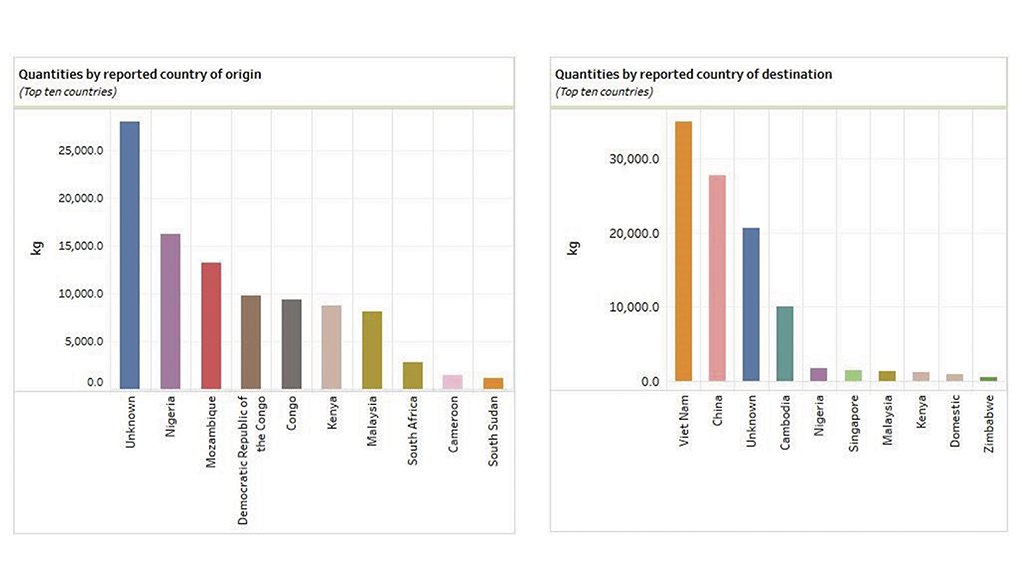
The FATF released their report on ‘Money Laundering and the Illegal Wildlife Trade’ a topic that has been sitting on the side-lines for a long time, overshadowed by more prominent criminal ventures, such as drug trafficking. Although the market pales compared to the vast sums moved in the drug space, it’s still the 4th most lucrative trade. Billions of dollars are made at the cost of our natural environment and the economical longevity of the affected countries and regions.
If we look at it from a wider angle and understand illegal wildlife trade (IWT) as part of environmental crime (that means including Illegal logging, mining, or waste management), then the FATF estimates the problem to range from $91 billion to $259 billion annually. Just for a sense of scale, estimates range from nearly double to triple the annual value of the estimated human trafficking proceeds.
Now, one might think that IWT is very much a regional issue: Iconic wildlife such as elephants are poached in Africa, and probably in Asia, too, and the proceeds are primarily sold in East Asia, where followers of traditional Chinese medicine advocate various health benefits. However, that is in fact not the case.
Here are some of the facts:
- While IWT does involve poaching of many iconic animals, it also involves various species that most people probably never heard of, such as glass eel smuggling from the US
- Trade routes are as global as those for any other illicit trade. According to Europol, the EU is a major transit point between Africa and Asia, and perhaps more importantly, the European fashion industry accounts for a whopping 96% of the python skin trade. If we’re looking at the trade of live animals such as tropical birds or snakes, the trade might very well be just between South and North America.
- The United Nations Office on Drugs and Crime (UNODC) has found that both the countries of origin and destination are often unknown, as seen in the diagrams below.
- The methods for trafficking wildlife or the money laundering that’s involved are hardly new. As the FATF report shows, criminals use tactics such as mingling their illicit proceeds with legal ones, mislabelling shipping containers and forging documents. Hence, this also becomes a dimension of the wider trade-based money laundering problem, because from that perspective there is no difference between the content of a container being forged goods or ivory, or between people wanting to earn illicit money through trade fraud or selling powdered rhino horn.
The responsibilities that financial services organizations have to detect and fight money laundering also apply to illegal wildlife trafficking. Here are some of the key things you should know:
- Wildlife trafficking can be described around 3 phases: source, transit, and destination. While China is the largest receiver of wildlife items, Cambodia, Indonesia, Singapore, and Hong Kong are key receivers as well.
- IWT risk must be part of a bank’s risk framework and their AML risk assessment, e.g., by adding high-risk sources (Africa, South America), transit (EU), and destination countries (see above). Additionally, other high-risk industries to consider include medicine goods companies and leather goods companies but also general trading companies. Keeping an eye out to ensure transactions types match profiles is a good first step.
- Shell or front companies are often used to ship wildlife or launder the proceeds. Customer due diligence to identify shell companies should also cover IWT though the same challenges often apply — just like other items like counterfeit goods, wildlife trade Items are sold under wrong goods description like food, plants, or medicals.
- Wildlife trafficking red flags have been identified and summarised based on available information (see page 60 of the FATF report on IWF). Work is underway to enhance these, particularly via the United for Wildlife’s Financial Taskforce, and FATF encourages more investigations. For example, check for increased volume of wire transfers from/to the source, transit and destination countries in combination with the high-risk industries, and also if the volume of the payment is not in relation with the type of business, e. g., schools, academies, game parks.
Typologies and monitoring scenarios should go beyond simple red flag indicators in order to appropriately detect the complex behaviour associated with IWT. Here is yet another area where machine learning and artificial intelligence can help not just humans this time – but wildlife as well.
AI models can uncover the relevant behaviours – including identifying outlier behaviour never seen before. For example, by using more spatial and temporal data, machine learning models can help find local park rangers or policemen accepting bribes more easily. They may identify unusual spending behaviour coupled with the vicinity to high-risk areas for IWT. Alternative payment providers such as mobile money companies might be able to incorporate geodata from cell phones to uncover suspicious behaviour.
Overall, the good news is that at FICO, we have seen more banks expanding the use of their technology to better monitor correspondent relationships or their trade finance products, and this is a positive step in helping stem the tide of Illegal Wildlife Trade.
Written by Erik Stretz, Fico Principal Consultant